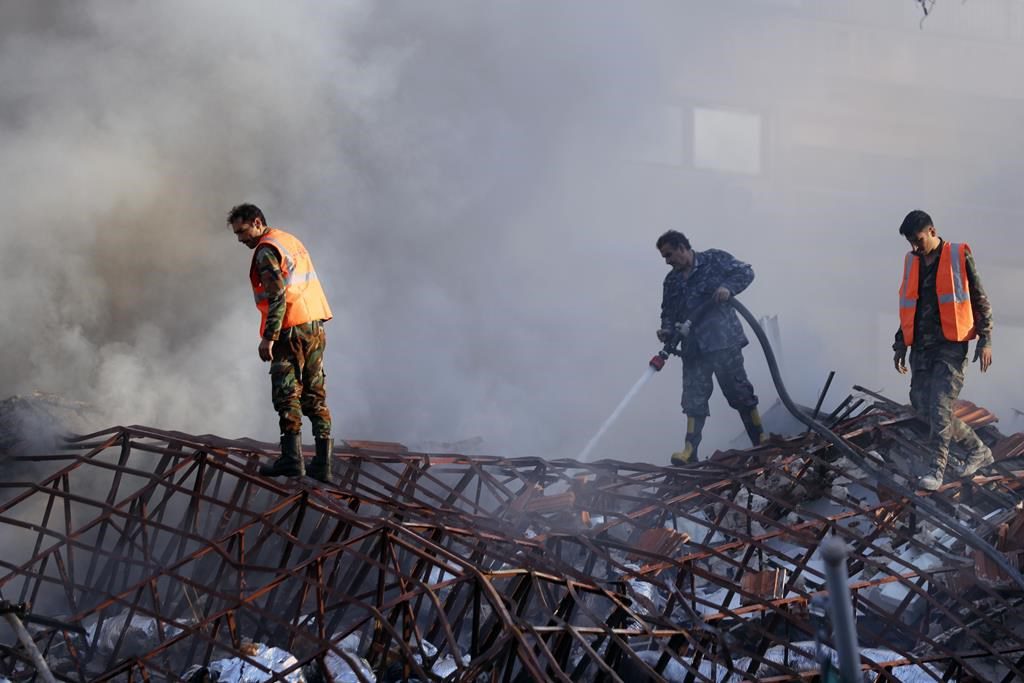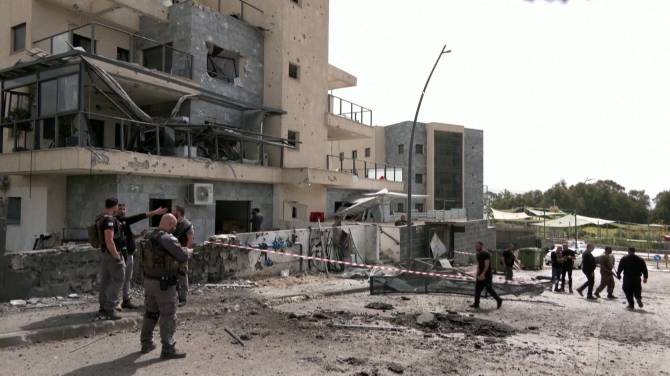Suspected Israeli warplanes attacked Iran’s embassy in Syria on Monday, marking an escalation in a war between Israel and its regional enemies. Tehran claimed that the strike resulted in the deaths of seven military advisors, including three senior commanders.
Emergency workers were seen on top of the debris of a destroyed building within the diplomatic compound, next to the main embassy building. Iranian flag was hanging from a pole amidst the wreckage, as witnessed by Reuters reporters at the site in the Mezzeh district of Damascus.
Both the Syrian foreign minister and interior minister were seen at the scene. Syria’s Foreign Minister Faisal Mekdad condemned the attack, stating that it targeted the Iranian consulate building and caused the deaths of several innocent people.
For a long time, Israel has targeted military installations belonging to its arch nemesis Iran and its allies in Syria. This comes alongside their efforts against Iran-backed Palestinian group Hamas in the Gaza Strip. Monday’s attack marked the first time Israel struck the extensive embassy compound itself.
Israel typically refrains from discussing its forces' attacks on Syria. When asked about the strike, an Israeli military spokesperson declined to comment.
Iran’s ambassador to Syria, Hossein Akbari, confirmed that five to seven individuals, including some diplomats, were killed in the strike. He also stated that Tehran’s response would be severe.
Iran’s Revolutionary Guards Corps announced that seven military advisors, including senior commander Mohammad Reza Zahedi of Iran’s elite Quds Force, were killed in the strike.
Tehran's state media reported that Zahedi was believed to be the target of the attack. Additionally, his deputy and another senior commander, along with four others, were killed.
Iran’s Arabic Language Al Alam Television revealed that Zahedi had served as a military advisor in Syria, acting as the head of the Quds Force in Lebanon and Syria until 2016.
A section of the building is used as the ambassador's residence
According to a military source, Syrian state media reported that Israel launched an attack from the occupied Golan Heights on the Iranian embassy, with Syria successfully intercepting some missiles using its air defense system.
The Iranian ambassador mentioned that the strike targeted a consular building within the embassy compound, with his residence situated on the top two floors.

View image in full screen
The White House did not immediately respond to a request for comment. State Department spokesperson Matthew Miller informed reporters at a regular news briefing that the United States remained concerned about anything that could escalate conflict in the region.
Miller explained that he did not anticipate it affecting talks on the release of Israeli hostages held by Iran-backed Hamas.
After Hamas' attack on Israel on October 7, leading to the war in Gaza, Israel has increased airstrikes in Syria against Iran's Guards and the Tehran-backed Lebanese armed group Hezbollah, both of which support President Bashar al-Assad's government.
Last Friday, Israel conducted its deadliest strikes in months on northern Syria's Aleppo province and killed a senior Hezbollah fighter in Lebanon. It has also frequently targeted the airports in Aleppo and Damascus in an effort to stop Iran's weapons transfers to its allies.
On Monday, the Israeli military announced that it had prevented advanced weapons, such as shrapnel charges and anti-tank mines, from being smuggled into the West Bank from Iran.
It stated that the weapons were found during an operation against a Hezbollah operative based in Lebanon and the Iranian Revolutionary Guard, which it alleged was recruiting agents to smuggle weapons and carry out attacks in the West Bank.
Rear Adm. Daniel Hagari, the chief spokesman for Israel's army, stated late Monday that a drone attack on a naval base in southern Israel early Monday was “directed by Iran.” The army reported that there were no injuries and only minor damage to a building.
—With additional files from the Associated Press




